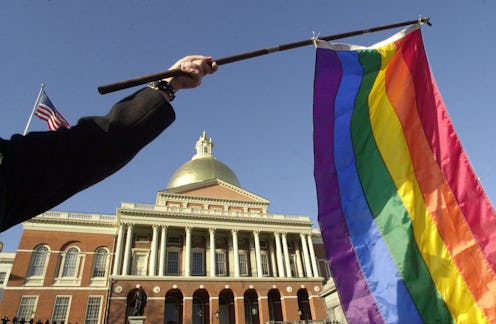News
What The Virginia Gay Marriage Ruling Really Means
On Monday, an appeals court based in Virginia overturned the state's gay marriage ban in a 2-1 decision, which could pave the way for legal same-sex marriages in Virginia, North Carolina, South Carolina, and West Virginia in the near future. The 4th U.S. Circuit Court of Appeals, based in Richmond, spans all four states as well as Maryland, where same-sex marriage is already legal, so the court's decision — while not in effect yet — could impact all five states.
The court argues that while there are people who are "deeply uncomfortable" with gay marriage, this is not a legitimate reason to withhold "same-sex couples due process and equal protection of the laws." We'll say.
Judge Henry F. Floyd wrote:
Civil marriage is one of the cornerstones of our way of life. It allows individuals to celebrate and publicly declare their intentions to form lifelong partnerships, which provide unparalleled intimacy, companionship, emotional support, and security. Denying same-sex couples this choice prohibits them from participating fully in our society, which is precisely the type of segregation that the Fourteenth Amendment cannot countenance.
So what does this really mean for Virginia, and the four other states in the 4th Circuit Court of Appeals? It's not clear when this decision would be put into effect for Virginia, and it really depends on what moves the players in this game decide to make next.
Immediate Impact
Marriage licenses are distributed by the local circuit courts in Virginia. If the defendants in this case do not request a stay, the decision could be put into effect immediately in Virginia, which would ultimately apply to the four other states in the 4th Circuit. (Maryland is included in the 4th Circuit, but that state has already legalized gay marriage). This decision does not require all clerks in South Carolina, North Carolina, and West Virginia to start issuing marriage licenses to same-sex couples now or if and when the court's ruling does take effect. However, there's nothing stopping individual clerks from issuing marriage licenses to same-sex couples based on the court's decision.
Delaying The Decision
In this particular case, it's likely the defendants will request a stay so that the case is heard by more than three judges. If a stay is requested, the case could be reviewed by the Full 4th Circuit Court of Appeals or the Supreme Court. Former U.S. Solicitor General Ted Olson told press there is "a very significant likelihood" that those against same-sex marriage will request a stay.
While some local circuit court clerks could issue marriage licenses now along with warnings that there's a lot of uncertainty surrounding the issue, that doesn't mean many, if any, would begin issuing licenses until this ruling is set in stone. Arlington Circuit Court Clerk Paul Ferguson says his office is prepared if the ruling takes effect in August, but it's "unlikely." Ferguson says:
The Arlington Circuit Court Clerk's office will issue marriage licenses to same-sex applicants as soon as we are certain they would be valid. If a stay is not granted, Arlington will start issuing marriage licenses to same-sex applicants immediately. If the stay is granted, it is likely we will need to wait until the Supreme Court rules.
What The Four Other 4th Circuit Court States Will Do
After hearing the decision, North Carolina's Attorney General Roy Cooper, a Democrat, made a statement at a news conference, saying his office will no longer defend the state's gay marriage ban after the 4th Circuit Court of Appeals ruling.
Our attorneys have vigorously defended North Carolina marriage law, which is their job. But today we know our law almost surely will be overturned as well. Simply put, it is time to stop making arguments we will lose and instead move forward, knowing that the ultimate resolution will likely come from the U.S. Supreme Court.
But it's a different story in South Carolina. Attorney General Alan Wilson, a Republican, says he will uphold the gay marriage ban in his state. He says, "currently, South Carolina's law remains intact. People should not rush to act or react until that time when a decision is made by the highest court in the land."
In West Virginia, it's not completely clear what government officials will do. Attorney General Patrick Morrisey told the Associated Press that he is still looking over the court's decision, and won't make any comments until the decision is final. However, U.S. District Judge Robert C. Chambers is in the midst of a case in which three same-sex couples are challenging the state's ban.
Chambers said he would wait to see what the 4th Circuit Court decided to do before making his final decision. Even though this ruling doesn't immediately take effect in West Virginia, that doesn't mean Chambers can't make his ruling now. Beth Littrell, the plaintiff's attorney in this West Virginia case, noted that the plaintiffs plan to request that Chambers rule on their case ASAP.
Images: Getty Images (3)
